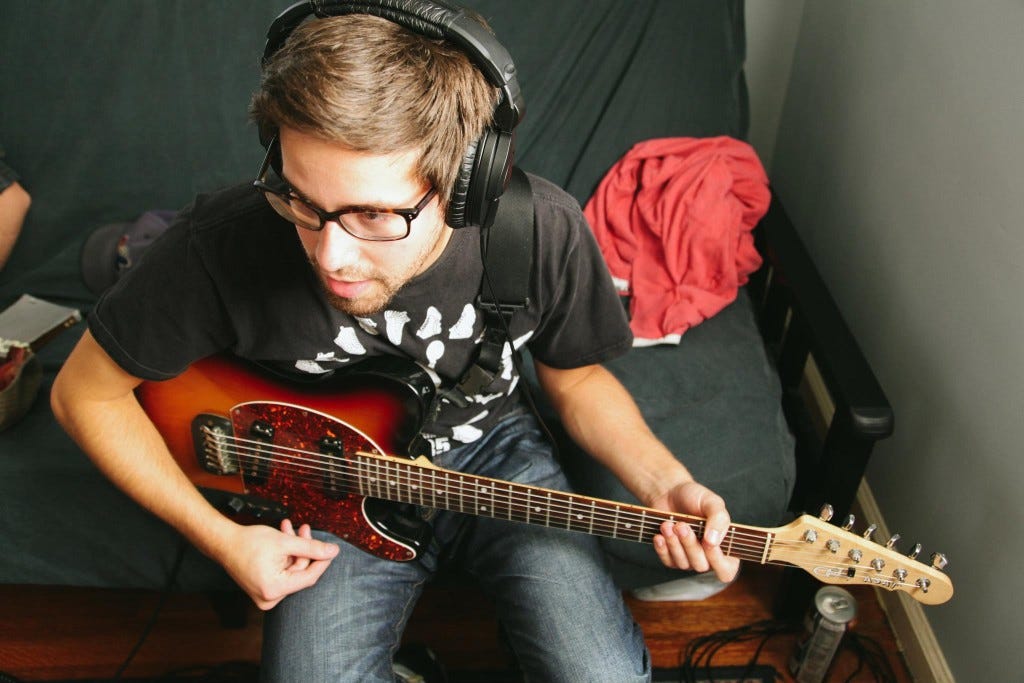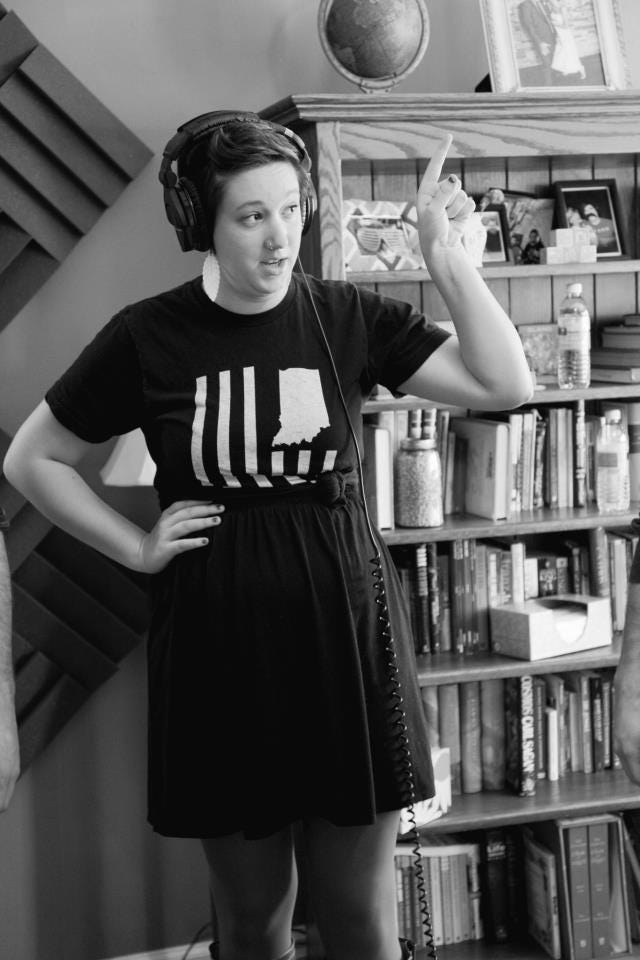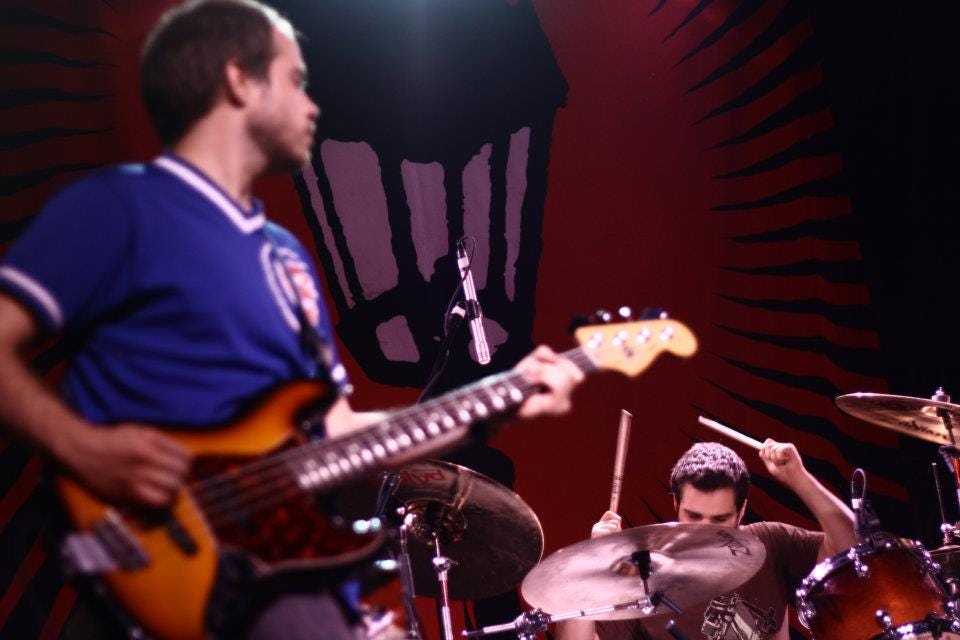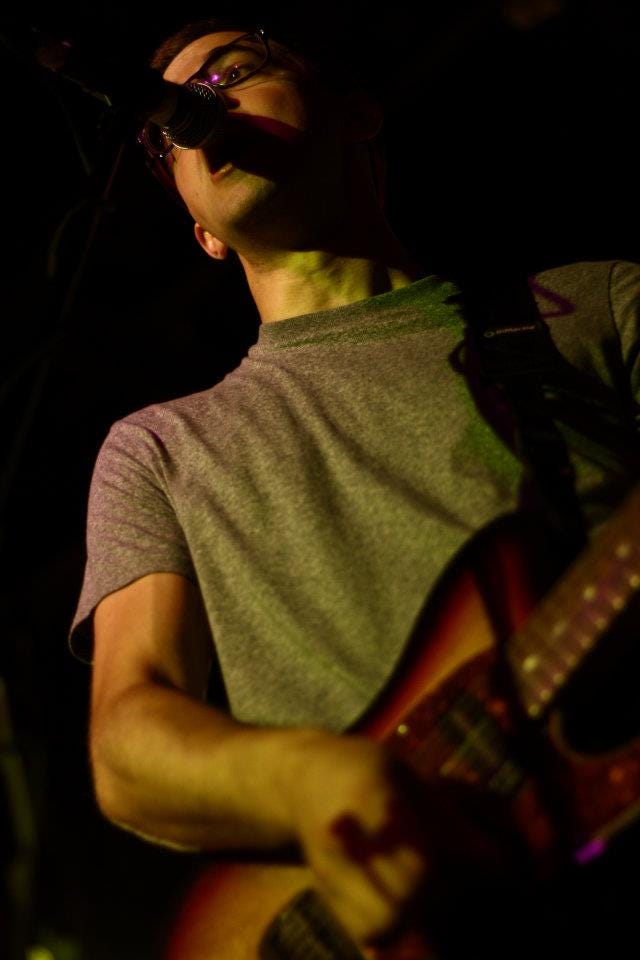What You've Done Well: Rodeo Ruby Love Preps for Their Final Show
by Donovan Wheeler photos by Anna Teeter, Kris Carter, and Gabrielle Cheikh
[dropcap]A[/dropcap]nna Teeter’s intimate photos of Rodeo Ruby Love’s “studio session,” illustrate perfectly what made the group not only a Hoosier phenomenon, but a nationally recognized act as well. In many frames the bandmates lounge in a comfortable, homey living room, visibly crack jokes and cut up; while in other shots they adorn headphones, work sound data on their mixing software, and trade opinions on technical song points. Whether the band is completely off-focus or seizing an opportunity for a gag, or whether they are completely dialed in, determined to make every bar sound perfect, the band’s two very different faces always merge into one infectious collection of fun. “Fun” however is too dismissive of a word. From their inauspicious beginning a decade ago playing small venues north of Indy to their ascension to the national stage touring with the likes of Streetlight Manifesto, Rodeo Ruby Love’s true success stemmed from their authenticity—that sense you get when you see someone on stage and you can unequivocally tell that the experience they had recording in that living room is little different from the one they bring a stage before a crowd the size of a small town.
That was the mood I felt when I first saw them last year at the Vogue. And in an experience which identically matched the description Love’s founder and front-man, Zachary Melton gave describing the behavior of most crowds they faced, I found myself standing middling toward the back, arms folded, waiting for them to wrap up so Red Wanting Blue could hit the stage. But by the third song I was tapping my foot, by the fourth song I was moving (not rhythmically, however, I lack that skill). By the end of the set, I was singing all the lyrics I could catch onto—the band’s smart of use of repetition made that pretty easy—and wishing they’d add another half-hour to their gig.
Sadly, I personally discovered the band (named after both Melton’s grandmother, “Ruby Love” and his favorite Garth Brooks song, “Rodeo”) as they were winding down. That Vogue appearance was one of only two for all of 2014. Sadder still comes the news that, after this month, Rodeo Ruby Love will go farther than the “winding down” stage when they perform for the final time at Fountain Square in the increasingly popular Hi-Fi on Virginia Avenue. As my own brew of whimsical anticipation grew, I reached out to Melton, who was more than happy to share his thoughts about taking a modest Central Indiana musical group and turning it into something that most musicians only dream about.

DW: How would you describe your style of music to someone who isn’t familiar with you?
ZM: “For a long time, our ‘go-to’ answer for that was: ‘It’s kind of like Weezer.’ It’s a generic, upbeat sort of pop-rock music. But recently, especially with the last record, I don’t feel as if that answer gives what we do justice. But I still tell people: ‘We’re a pop-rock band, and we write catchy tunes which get stuck in your head.’”
“When Kyle Kammeyer was in the band, he and I were simply huge pop-rock music fans. He loved Amy Grant and Billy Joel, and I liked a lot of country music and that sort of thing. I’m a sucker for good melodies. Often, that’s how we would start our songs: I’d hear a melody in my head, and then we would build around that. And that established our forte for coming up with something that sticks with you.”
DW: And you guys have been playing for how long…?
ZM: “My brother-in-law, Erik, recently reminded me that last month marked the tenth anniversary of our very first show. We probably started the year before that, then moved to our first set of shows. Then a very few of us sat down and recorded our first record in the winter of ’05 which we released the following year.”
“At the time I was already in a different band which was pretty well established in the north-central Indiana/Kokomo area, so the early version of Rodeo Ruby Love would play in community buildings and churches. I went to Indiana Wesleyan, so we played several shows there. Since I was already in the other band, and a lot of people knew me, it was easy to land shows for the new band.”
[dropcap]T[/dropcap]hat early incarnation, a heavily acoustic version of Rodeo Ruby Love, produced 2006’s YOUR LOVE HAS MADE EVERYTHING BEAUTIFUL. More importantly, they pulled it off with an air of the carefree. From the minute-long intro (a collection of cascading harmonies titled “The Bastard Children of Science”) to the coffee-house precursor to 2011’s “Small House in the City,” BEAUTIFUL offers all the trademarks of Love’s sound: Soothing female harmony, an upbeat tempo, strong melodies, and Melton’s signature vocal range. His voice always fluid, Melton can go (a little bit) low, but he can bounce around among the high octaves with nary a pitch warble or vocal crack. Whether he’s fronting the refrain in a clever tune such as “It Was Weird” or leading a team harmony in equally smart track like “Ricky Henderson,” Melton’s voice rings. Despite those solid vocals, the earliest form of the band which pleased Melton soon hit a “life bump.”
ZM: “After a little while we finally found a good combination and at that time there were two guys in the band: Dave—who played ukulele and banjo—and Erik—who played bells and vibraphones. Eventually, while we were in college, those two left. We were living in different cities, and they couldn’t make it work. So, after they left the energy level dropped. We really missed them. We had some people fill in, and to kind of make up for the difference, we cranked up the distortion and tried to compensate by making more noise.
Forced to reinvent the band, Melton turned to his sisters.
ZM: “Including female members was part of the idea from the beginning. At first we included a singer from a Muncie band who was very good…very popular, but the chemistry didn’t work very well. I sort of started over after that. Meanwhile, my sister, Annie, often critiqued my early singers, making sure that I knew that she could sound much better, so I finally said, ‘Alright, let’s bring you in and give it a go.’ And we clicked right away. We have similar singing styles, and we harmonize well.”
“At first she played a chord organ, hitting a few notes along the way. But when we brought in Kurt Friedrich—who played the keyboard, and also owned equipment that didn’t break every other day—we moved Annie to vocals only. She finally found her groove, and then when my other sister joined, their dual harmonies started work really well together.”
[dropcap]I[/dropcap]n short order, Rodeo Ruby Love released another pair of discs, RODEO RUBY LOVE vs. THE GREAT AMERICAN CITIES (2008) and THIS IS WHY WE DON’T HAVE NICE THINGS (2011), and by 2013 they found themselves moving from community centers and local gatherings to big stages in big cities.
ZM: “We got onto our first big tour with Streetlight Manifesto and Reel Big Fish, and that first week was a whirlwind of nerves. None of us had ever played anything big like that. Dillon Enright was constantly throwing up before shows, and I was a nervous wreck…it was tough. We’re used to playing basements and buildings with no one in them, and suddenly we’re playing in front of a thousand people at the House of Blues.”
“That HOB gig in Chicago was the first ‘big’ show for us. It was a magical moment, really. I’m on stage, I’m with my two sisters (the first time were all together like that since we were kids), my folks are there, and we’re in front of a sold-out crowd.”
DW: What did your parents think about your success?
ZM: “My parents have always been supportive, but it was after that night, when they saw everything that was happening and saw how the crowd was into it…that’s when they said, ‘Ok, we finally get it.’”
As quickly as the band rose, the cost of that success started to bear its weight. Some of the factors that led to Love’s end were self-inflected, such as Melton’s admitted stress which comes from obsessing over small details and the general effort it takes anyone in any setting to get along with people we spend inordinate amounts of time with.
ZM: “Writing our last record, THE PITS, was a difficult challenge. For the first time I was aware that people I didn’t know were going to be listening to end product, whereas, with the earlier records, I always thought, ‘Eh, who cares? I’ll just do what I want because only my friends are going to hear this.’”
“Even though we did really well on the road, I was never comfortable with that sense of self-consciousness about THE PITS.”

[dropcap]B[/dropcap]esides Melton’s escalated fretting over stylistic and technical points in the new album, the additional stressors and pressures of booking and budgeting, played a role as well. Running a band is work, and that 60-90 minutes on stage too often requires a full day’s worth of the sort behind-the-scenes office-discipline you’d see in a successful small business that’s doing thousands of dollars a day. But as any businessperson will assert, success also hinges on the category dubbed “out of our control.” For Rodeo Ruby Love those dice didn’t land well.
ZM: “The owner of our label was embroiled in some legal battles, and he simply wasn’t able to give us the support which we thought we were going to have. We also emailed, called, texted everyone we knew in the business looking for a manager and a booking agent and things such as that, but no one was available.”
One of the factors which often created these booking and contract issues was arguably the element which made the band distinct…and brilliant as well.
ZM: “It’s really hard to ‘place’ us. You can put us on a ska tour, you can put us on a rock tour, but whatever it is, we don’t really fit in very well. In one sense, that was always something about us that was really exciting. One of my favorite bands is Piebald, and they don’t really fit in either. They’re from Boston, and they’re a really good rock band, but they’re kind of quirky and weird. You put them with emo bands or with hardcore bands, and it doesn’t work all the time. So, I think we sort of fell between the cracks. We never really wanted to be anything other than just a bunch of goofballs. We worked hard…worked really, really hard, but we weren’t going to put on vests or fedoras in order to fit a stereotype, and I think that kind of bit us in the end.”
“Of course, eventually, everything obviously started to hit a downslope. By the time we neared the bottom it, many of us were ready to ‘not’ be in a full-time band…go get full times jobs…and then basic things like having insurance suddenly started to sound really nice. Then I was accepted into a graduate school program, and that largely sealed it for me. So, we decided, let’s just have a last go, which puts us where we are now.”
DW: What are you studying?
ZM: “Viking and Medieval Norse literature.”
As an English major myself, I couldn’t help but appreciate Melton’s choice of study. I didn’t ask him if he preferred the Burton Raffel or Seamus Haney translation of Beowulf (I’m betting it was the Haney version), but I did ask him if studying Medieval literature meant the end of music. Not only was the answer, “no,” but he has actually been working on a collection of songs which draw from Norse literature. Given that the original Pagans Scops often recited the epic poems in their heads to the up-tempo accompaniment of a small type of ukulele, his answer seemed better than fitting.
ZM: “I’m doing other projects, too. I just recently put out…kind of…a solo work. After THE PITS, I felt frustrated and wanted to kind of do my own thing for a little while. So my buddy, Burke Sullivan (he used to play with New Terrors) and I were sort of working on a record of seven songs based on the Harry Potter series. We worked on it for about a year, and it was really fun. We were always cracking up, and we would get lost watching ‘90s country music videos…we’d just lose a whole day. It was low-key, it was fun, and the album turned out great. Then Crossroads of America Records released it on cassette which also very, very cool.”
“As for Rodeo Ruby Love—unless I’m suddenly hit with a flurry of songs or ideas come out of me—this upcoming show will be it, for good.”
DW: So how do you feel as you near the final performance?
ZM: “It’s exciting, really. For most of us, meeting for practice is almost impossible because we’re all so busy with our own lives. And I think most of us have been ready for a while. We’re thinking something along the lines of, ‘We did it, it was great, and now it’s time to put it to rest.’ There’s really no sad feelings. We had really slowed down last year, and because of that we felt less pressure. We all got along more easily, and the practices were much more fun.”
“We even found time to record last February in Nashville. So hopefully next week we’ll be putting out an album of ‘B-sides’ and demos. It’s sort of the last incarnation of Rodeo Ruby Love, so that’s going to be exciting, too.”
“It’s going to be goofy for sure. Some ex-members are coming back to play a song or two with us.”
[dropcap]A[/dropcap]s much as I wish I had found this band five years ago, I’m still deeply thankful I did stumble upon them. And even though they won’t walk onto the stage again, what they’ve created isn’t going away. Whether we’ve “forgot[ten] about [our] convictions in the back seat of 97 Chevy Cavalier” or have been “slip[ping] and slid[ing] through grave yard mud,” we will always have at our fingertips an impressive body of work forever capturing the energy and power which made Rodeo Ruby Love the band we listen to when we need to move around and feel happy, a sentiment Melton himself echoed near the end of our conversation.
ZM: “Our motive all this time has been for Rodeo Ruby Love to put on a good show, write some catchy tunes, create some fun, and give people a good time. I hope there’s no tears; I hope there’s no sad goodbyes. Everyone who knows us, knows that we’ve been ‘over’ the band for a while now. So, I think this will be a celebration of a good thing. We’re going play some old hits and have a good time.”
Rodeo Ruby Love:
Current members
Zack Melton - lead vocals, guitar (2005–present)
Annie Cheek - vocals (2005–present)
Kurt Friedrich - keyboard (2005–present)
Dillon Enright - drums (2005–present)
Ben Claghorn - bass (2005–present)
Steve Marino - guitar (2005–present)








